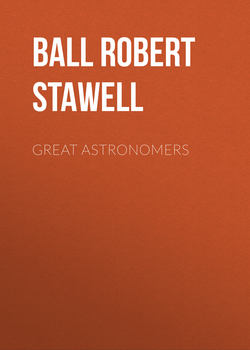Great Astronomers

Реклама. ООО «ЛитРес», ИНН: 7719571260.
Оглавление
Ball Robert Stawell. Great Astronomers
PREFACE
INTRODUCTION
PTOLEMY
COPERNICUS
TYCHO BRAHE
GALILEO
KEPLER
ISAAC NEWTON
FLAMSTEED
HALLEY
BRADLEY
WILLIAM HERSCHEL
LAPLACE
BRINKLEY
JOHN HERSCHEL
THE EARL OF ROSSE
AIRY
HAMILTON
LE VERRIER
ADAMS
Отрывок из книги
Of all the natural sciences there is not one which offers such sublime objects to the attention of the inquirer as does the science of astronomy. From the earliest ages the study of the stars has exercised the same fascination as it possesses at the present day. Among the most primitive peoples, the movements of the sun, the moon, and the stars commanded attention from their supposed influence on human affairs.
The practical utilities of astronomy were also obvious in primeval times. Maxims of extreme antiquity show how the avocations of the husbandman are to be guided by the movements of the heavenly bodies. The positions of the stars indicated the time to plough, and the time to sow. To the mariner who was seeking a way across the trackless ocean, the heavenly bodies offered the only reliable marks by which his path could be guided. There was, accordingly, a stimulus both from intellectual curiosity and from practical necessity to follow the movements of the stars. Thus began a search for the causes of the ever-varying phenomena which the heavens display.
.....
When he reached his home on this memorable evening, Tycho immediately applied his great quadrant to the measurement of the place of the new star. His observations were specially directed to the determination of the distance of the object. He rightly conjectured that if it were very much nearer to us than the stars in its vicinity, the distance of the brilliant body might be determined in a short time by the apparent changes in its distance from the surrounding points. It was speedily demonstrated that the new star could not be as near as the moon, by the simple fact that its apparent place, as compared with the stars in its neighbourhood, was not appreciably altered when it was observed below the pole, and again above the pole at an interval of twelve hours. Such observations were possible, inasmuch as the star was bright enough to be seen in full daylight. Tycho thus showed conclusively that the body was so remote that the diameter of the earth bore an insignificant ratio to the star's distance. His success in this respect is the more noteworthy when we find that many other observers, who studied the same object, came to the erroneous conclusion that the new star was quite as near as the moon, or even much nearer. In fact, it may be said, that with regard to this object Tycho discovered everything which could possibly have been discovered in the days before telescopes were invented. He not only proved that the star's distance was too great for measurement, but he showed that it had no proper motion on the heavens. He recorded the successive changes in its brightness from week to week, as well as the fluctuations in hue with which the alterations in lustre were accompanied.
It seems, nowadays, strange to find that such thoroughly scientific observations of the new star as those which Tycho made, possessed, even in the eyes of the great astronomer himself, a profound astrological significance. We learn from Dr. Dreyer that, in Tycho's opinion, "the star was at first like Venus and Jupiter, and its effects will therefore, first, be pleasant; but as it then became like Mars, there will next come a period of wars, seditions, captivity, and death of princes, and destruction of cities, together with dryness and fiery meteors in the air, pestilence, and venomous snakes. Lastly, the star became like Saturn, and thus will finally come a time of want, death, imprisonment, and all kinds of sad things!" Ideas of this kind were, however, universally entertained. It seemed, indeed, obvious to learned men of that period that such an apparition must forebode startling events. One of the chief theories then held was, that just as the Star of Bethlehem announced the first coming of Christ, so the second coming, and the end of the world, was heralded by the new star of 1572.
.....